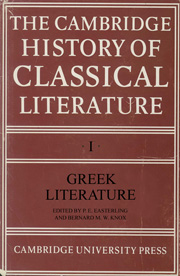Book contents
- Frontmatter
- 1 Books and readers in the Greek world
- 2 Homer
- 3 Hesiod
- 4 The epic tradition after Homer and Hesiod
- 5 Elegy and iambus
- 6 Archaic choral lyric
- 7 Monody
- 8 Choral lyric in the fifth century
- 9 Early Greek philosophy
- 10 Tragedy
- 11 The satyr play
- 12 Comedy
- 13 Historiography
- 14 Sophists and physicians of the Greek enlightenment
- 15 Plato and the Socratic work of Xenophon
- 16 Oratory
- 17 Aristotle
- 18 Hellenistic poetry
- 19 Post-Aristotelian philosophy
- 20 The literature of the Empire
- 21 Epilogue
- Appendix of authors and works
- Metrical appendix
- Works Cited in the Text
- References
17 - Aristotle
Published online by Cambridge University Press: 28 March 2008
- Frontmatter
- 1 Books and readers in the Greek world
- 2 Homer
- 3 Hesiod
- 4 The epic tradition after Homer and Hesiod
- 5 Elegy and iambus
- 6 Archaic choral lyric
- 7 Monody
- 8 Choral lyric in the fifth century
- 9 Early Greek philosophy
- 10 Tragedy
- 11 The satyr play
- 12 Comedy
- 13 Historiography
- 14 Sophists and physicians of the Greek enlightenment
- 15 Plato and the Socratic work of Xenophon
- 16 Oratory
- 17 Aristotle
- 18 Hellenistic poetry
- 19 Post-Aristotelian philosophy
- 20 The literature of the Empire
- 21 Epilogue
- Appendix of authors and works
- Metrical appendix
- Works Cited in the Text
- References
Summary
For the history of Greek literature, philosophy, from Aristotle onwards, is important in at least three different ways. First, style and genre: the literary presentation of philosophy, sometimes within the same writer, varies on a scale which may range from what is little more than technical shorthand to highly polished prose. Some philosophers of the Hellenistic period even present their ideas in verse, and quotations, especially from the most famous poets, are not uncommon.
Secondly, literary theory: Aristotle himself, and some later Greek philosophers, made fundamental contributions to the theory of rhetoric and to literary criticism. Much of their work in this field was taken over by later classical writers, especially the Roman rhetoricians, and it has had a continuing influence.
Thirdly, thought. This must be considered when it directly influences the subject matter of literature. In this respect Aristotle is much less significant than the Stoics and Epicureans. The philosophy of Epicurus is Lucretius' theme and Lucretius is a poet of comparable genius to Virgil. But Lucretius is only the most notable of many poets and other writers whose work was strongly influenced by Epicureanism or Stoicism. Today that influence looks decidedly more marked on Roman literature than on Greek. But this is due, at least in part, to the loss of nearly all Greek literature from the last three centuries B.C. There can be little doubt that Stoicism and Epicureanism had a pervasive influence on later Greek culture.
- Type
- Chapter
- Information
- The Cambridge History of Classical Literature , pp. 527 - 540Publisher: Cambridge University PressPrint publication year: 1985
References
- 4
- Cited by



